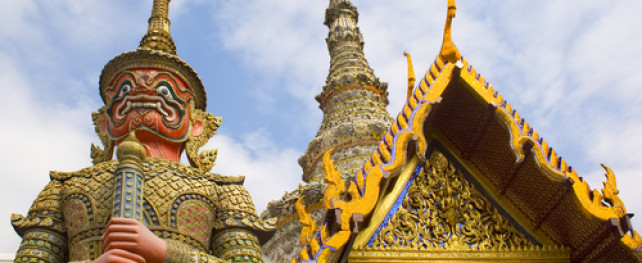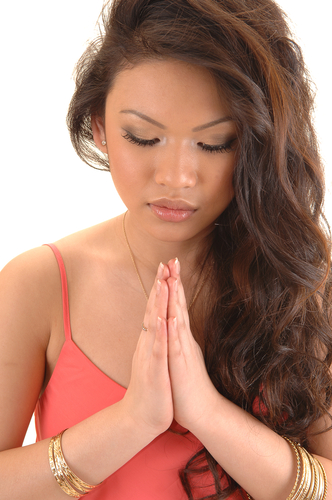Visiting Thailand Tradition and Customs to Learn Before You Fly
The wise traveler always collects a bit of knowledge before embarking on a trip in order smooth the transition between the familiar and the unfamiliar.
If you plan to visit Thailand, you are best advised to become familiar with its customs and traditions before you arrive. It will make your trip more enjoyable and fun and you won’t have to deal with situations that could have been avoided in the first place.
Trust me, it’s always better to “do as the locals do.”
So let’s look at some of the traditional Thai values and you can immerse yourself into the local customs…
How to Make the Most of Your Thailand Trip
Due to a long and uninterrupted cultural development, Thailand offers its visitors customs and traditions seen nowhere else on the planet. Thai people pride themselves on their unique set of values; values that pay homage to other human beings and Mother Nature in a number of ways.
This is actively demonstrated in the way Thais value natural beauty and aesthetic pleasures; everywhere you look you see and experience an abundance of fresh flowers, pleasing smells, vivid designs, colors and costumes, and an attention to detail in service industries rarely found on Western shores.
Thai people are very polite. Being polite is considered a virtue in Thailand. And you are smart to adopt the Thai way of life by demonstrating the same respect the moment you get up to the moment your head hits the pillow at night.
Treat others with the same respect you expect to receive in return, regardless whether you are greeting wait staff at a restaurant, hotel staff, or a stranger on the street. It’s simply considered “polite” to smile and look the other person in the eye while taking a slight bow or nodding your head.
When you observe Thai people and how they interact with one another you’ll soon see the deep levels of respect they extend in everything they do.
Traditional Thai Greeting
If you are planning on initiating a conversation, place both hands together in prayer position (in front of your heart), bow your forehead to your fingertips and say hello, or, if you prefer to learn a little Thai, say, Sawadee Kob (if you are male). Females should replace Kob with Ka.
This greeting shows that you appreciate the person you are speaking with. It also extends honor to their spirit – hence the significance of the head in prayer pose.
Once you have completed your conversation thank the person you’re speaking with by assuming the prayer pose again; bow your head and say, “Kob khun kob.”
What to Avoid
When traveling in Thailand there are certain types of behavior you must avoid – or lose face.
The first is to touch any person on the head, no matter how old they are. The head is considered the highest and most sacred part of the body according to Theravada Buddhism (the predominant Buddhist religion). Touching someone’s head is therefore considered extremely disrespectful.
Even if you meet a young child, never pat or rest your hand on the head of another person.
You also want to be mindful of your feet. While the head is the most sacred part of the body, feet are generally considered unclean. Don’t worry about this custom is you are receiving a massage or body treatment though, because your therapist will take care of all the customary details for you.
But if you are standing among a group of people or opposite a person, take care not to point your feet toward anyone in particular - unless you mean to ignore or disrespect that person. You should also refrain from placing your feet on objects that people touch or sit on, even if your intention is to relax.
Eating with a knife and fork in Thailand is an interesting custom that differs from Western culture. In Thailand, the fork is not an object you place in the mouth, but rather a tool for gathering or cutting food.
So, in order to respect local customs, gather your food with the fork, scrape it along the side of your spoon, and then put the spoon in the mouth to eat. You can also eat directly from your spoon if this is easier for you. Just remember that the fork is a common tool for Thais. It is not something you should wet with your tongue or in any way put in your mouth.
If you use chopsticks, never place them on the food bowl to rest. It is considered bad luck and symbolizes death. Don’t stress too much about managing and holding chopsticks at first. As long as you abide by the local customs the Thais will happily “oversee” your clumsy behavior.
Saving Face
We’ve already covered the concept of saving face in the first couple of issues. But it is such an integral part of Thai custom that it doesn’t hurt to be stressed again.
If you read the last two newsletters you already know that it’s considered rude to become angry. Not only that, but you certainly lose face if you show anger – which to Thai people is as much as losing credibility is to Westerners.
Not only that, when you lose face you also lose any bargaining power. Chances are you don’t get what you want so why bother getting angry?
By the same token, don’t put anyone else in a position to appear foolish or humiliated in front of others. It may be funny in Britain, Australia or in the States to poke someone for fun, but to Thais it’s not.
Avoid using sarcasm or any other mean-spirited humor. Focus on building a secure relationship with your partner first, and she will likely be open to some of the “customs” of your country in return.
Our company, www.datethailadies.com, will put you in touch with countless women who are looking for marriage and for a man who will join them in Thailand. We offer the option to meet pre-screened serious women who are looking for a real relationship, not to take your money. Why do Thai women look for Western men? Visit our site to read more!


